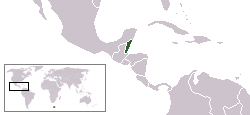Belize



A country in Central America. It shares borders with Mexico and Guatemala and is washed by the Caribbean Sea.
Capital
Belmopan
Official language
English
Currency
Belizean dollar (BZD)
Government
Parliamentary democracy. Head of State is the Queen of Great Britain, represented by Governor-General. Executive power is exercised by the government, headed by the Prime Minister. Legislative power is vested in a bicameral National Assembly.
Economy
Tourism along with agriculture plays a significant role in the country's economic development (18% of GDP). The main sights visited by tourists are the monuments of the ancient Mayan culture.
Legal system
Based on English common law.
Corporate law
- International Companies Act 1990
- Trusts Law 1992
- Trusts (Amendment) Act 2007
- Income Tax Amendment Act 1998
Types of companies
- International Business Company
- Private Companies
- Limited Liability Partnership
- Limited Life Companies
- Joint Ventures and Cooperatives
- Sole Proprietor
- Public Investment Companies
- Trust
International Business Company
- The authorized capital of the company is declared, there is no requirement for mandatory payment, minimum and maximum amount of the capital, it can be issued in any currency.
- Bearer shares, shares without par value can be issued in any freely convertible currency. Bearer shares must be kept by the registered agent. The required minimum is one share, payable in cash or through the transfer of other assets.
- The minimum number of shareholders is 1. A registered agent that is specified in the Memorandum and the Charter may act as a nominee shareholder, and it shall have a local license.
- Information on the beneficial owners of the company and shareholders is confidential and does not appear in public records, but the list of shareholders is kept at the registered office of the company.
- The meeting of directors may be held anywhere in the world. The minimum number of Directors is 1, corporate directors are allowed. Directors may be of any nationality. Data on the directors do not appear in public records. Nominee directors may be appointed.
- The AGM is conducted only at the request of the Board of Directors or at the request of the owner of more than 50% of the voting shares. The meeting may be held anywhere in the world, by telephone or other means of electronic communication, provided that all participants can clearly hear each other.
- The personal presence of the owners is not required for registration.
- No requirement to have a company secretary. But a secretary is usually appointed for conducting the company's affairs.
- Any activity not prohibited by law is allowed. A special license is needed to conduct banking, insurance and reinsurance, trust services. The company can not conduct business with residents of Belize, or invest in property located on the territory of Belize.
- Submission of quarterly financial statements, annual report and audit is not required. However, the company must keep accounting records that reflect its financial position.
- Company name shall not be identical or similar to the existing ones.
- At the request of third parties are available: full name, registration number, date of incorporation, the authorized capital, the name of the registered agent, registered office address of the company.
Trust
- The main elements of an offshore trust are: Founder (creator of the trust), Trustee (directly manages the assets) and Beneficiary (benefits from the trust). The founder and beneficiary need not be residents of Belize, the trust property must be located outside of Belize.
- Trusts are often created in order to transfer the inheritance. Trust of Belize can be beneficial for those who want to transfer assets to heirs on their own terms and without the application of the laws of their country, without paying high taxes.
- Belizian Trusts are used to avoid the use of the right to a compulsory share in the inheritance. It allows the founder to choose to whom and in what amount he is willing to leave his assets.
- Potential heirs can not impose trust lawsuits, the property of a trust can not be arrested.
- A lawfully created trust can not be canceled upon application of creditors of other jurisdiction or by a foreign court.
- Belizean Trust can be re-domiciled to another jurisdiction and vice versa.
- Registry data are not publicly available, unless the Founder allows access to them.
- Belizean Trusts can own any type of property, including precious stones and money in any country in the world.
- The benefits of a trust are the following: asset protection, privacy, the ability to invest assets in mutual funds or hedge funds, tax savings (no property taxes, gift or inheritance).
Foundation
- A Foundation may be established for an indefinite period of time.
- No data about the founder and beneficiaries appear in public records.
- For creation of a Foundation in Belize are required: a Founder (natural or legal person), a Guarantor (controls the Foundation), a Beneficiary, and a Council.
- After establishing of a Foundation it becomes a legal entity and, therefore, the owner of the Foundation's assets. As a result, the Foundation has no clear owner, and is created, usually in the interests of third parties.
- Foundation may own a wide variety of companies and assets, and may issue instructions, which, as in the case of trusts, shall be binding. Instructions are included in the registration document and the Foundation's Charter.
- Types of Foundations in Belize: Public Foundation (created by families, groups, etc.), Private Foundation (created by individuals, usually by private equity funds), State Foundation, Mixed Foundation (can be created by any persons of the above).
- Assets of a Foundation may be the following: shares and securities of private and public companies, bank deposits, investment portfolios, real estate, intellectual property rights.
- Benefits of a Foundation in Belize are: privacy, protection of personal wealth from financial and political instability in their jurisdictions, planning and allocation of assets, the lack of taxes on capital gains and profits.
Taxation
An offshore company is not subject to tax, does not pay taxes on dividends and interest, capital gains, etc., and it does not pay any duties if operates outside of Belize.
Agreements on avoidance of double taxation
No Agreements. Two agreement on exchange of information are signed with the UK and Norway.



 Currency Charts
Currency Charts